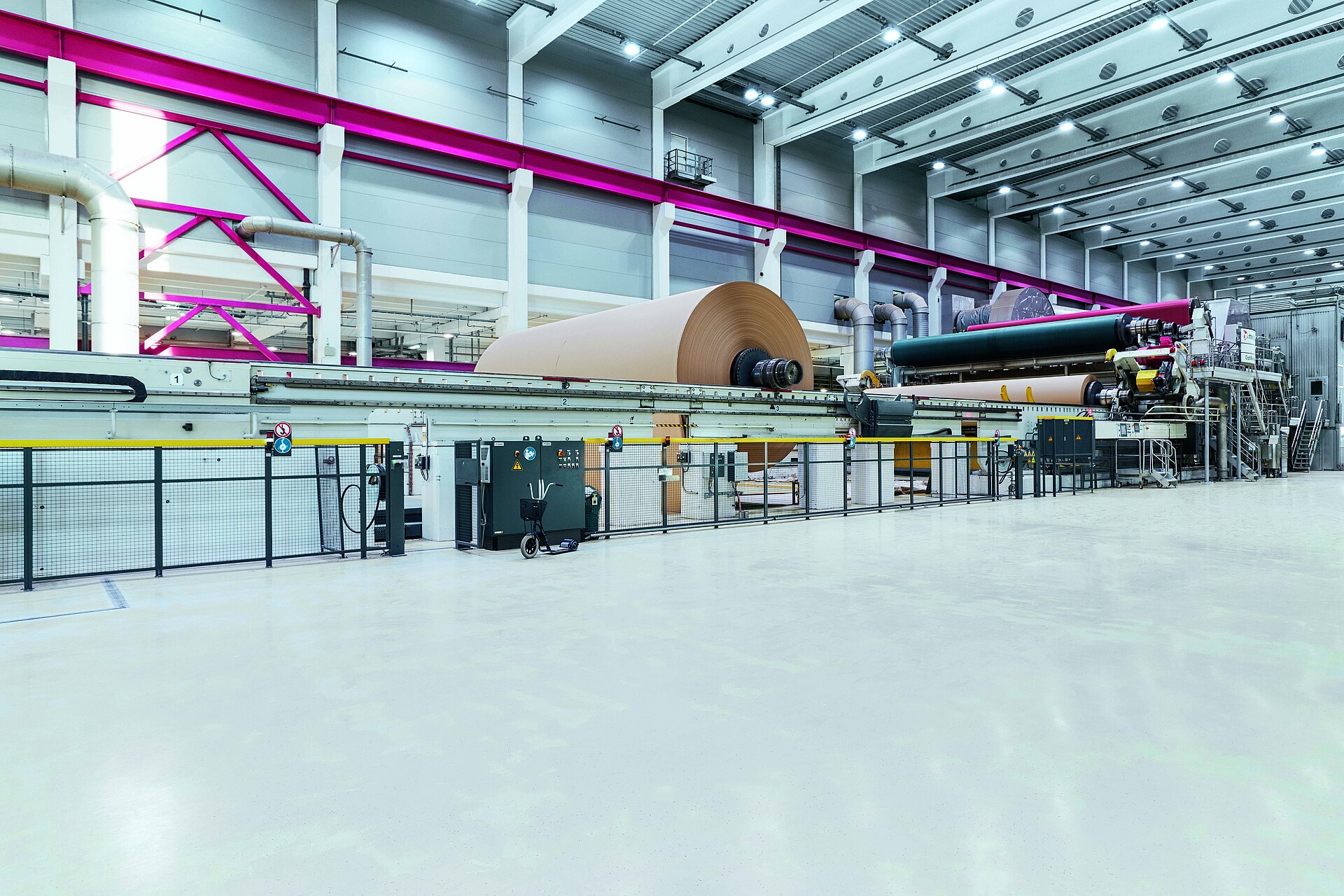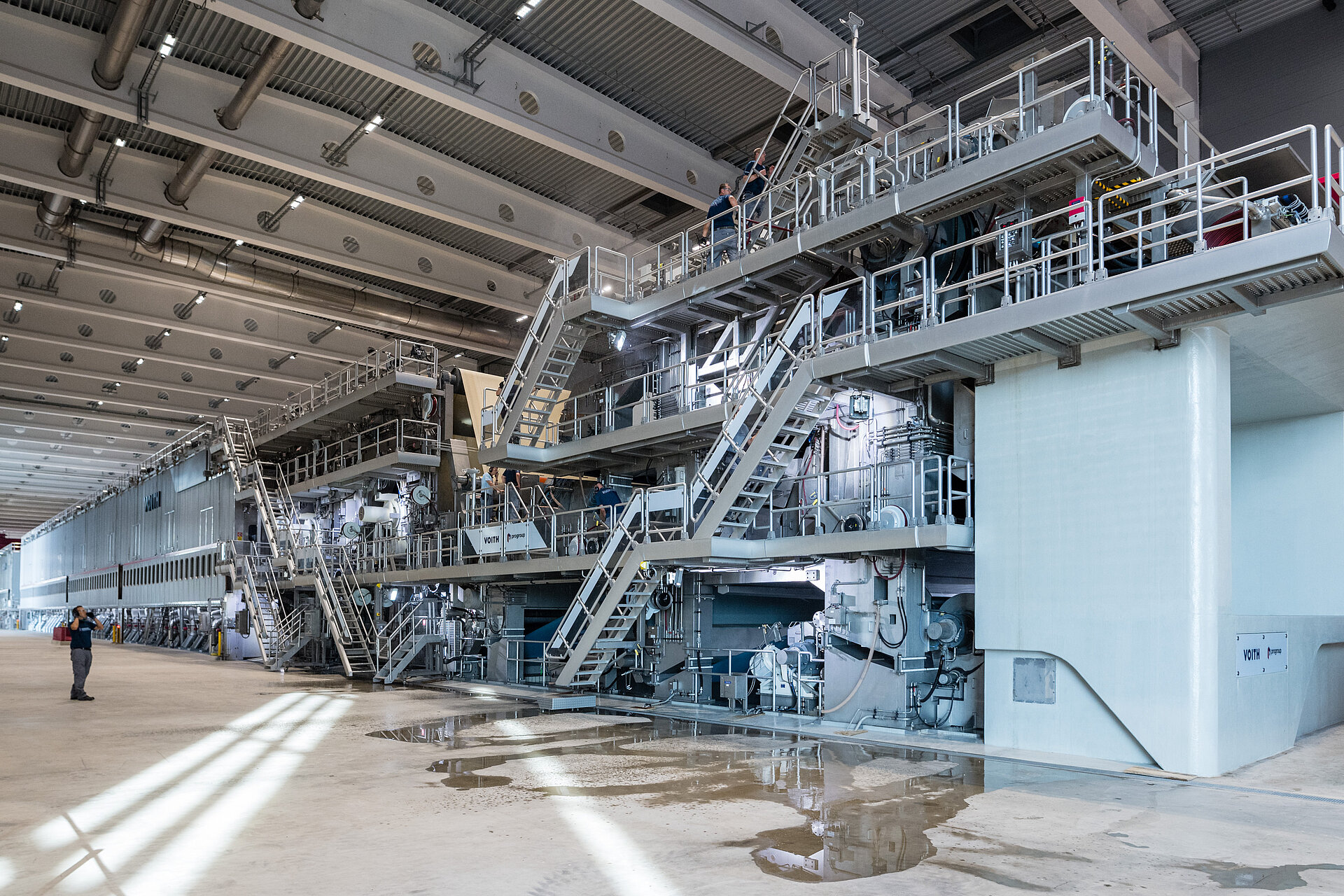Think long-term, act sustainably
![[Translate to English:] langfristig denken, nachhaltig handeln bei Progroup [Translate to English:] langfristig denken, nachhaltig handeln bei Progroup](/fileadmin/produkte/energie/Website_Header_Energie.png)
![[Translate to English:] langfristig denken, nachhaltig handeln bei Progroup [Translate to English:] langfristig denken, nachhaltig handeln bei Progroup](/fileadmin/produkte/energie/Website_Header_Energie.png)

To limit the use of fossil resources, Progroup operates an RDF combined heat and power plant at its Eisenhüttenstadt site. This supplies steam to Progroup’s PM2 paper machine, which is located right next to it. Progroup's PM2 thus considerably reduces the use of fossil fuels.

At the end of August 2020, PM3, Progroup’s third paper factory and one of the largest high-tech paper factories in the world, started operating at the Sandersdorf-Brehna site in Saxony-Anhalt.
The issue of sustainability was the top priority in constructing and operating the paper factory. This is why out of the total investment of 465 million euros, more than 100 million euros were invested solely in resource-conserving technologies. Another waste-to-energy power plant is currently being built here.
The paper industry is a resource-intensive industry. This is why ever since Progroup was founded in 1991 the company has pursued a consistent Green Hightech strategy. It has become increasingly relevant over the years. Exacerbated by the mega trends across the world of globalisation and population growth, there is an ever increasing demand for resources. At the same time, among other things because of economic growth and increased traffic levels, CO2 emissions are rising around the world, which is causing global warming and posing a real threat to our planet. We know that the resources on planet Earth are finite. This is why Progroup recognised its responsibility at an early stage and has consistently focused on conserving resources and reducing CO2 emissions in everything it does as a company.
The circular economy is therefore modelled on the natural cycle of materials and attempts to achieve multiple uses of materials with zero waste and zero emissions.
What this means for Progroup is wherever possible employing technologies which seek to deliver zero waste and zero emissions. For example, the self-contained water cycle means that the “waste to energy” principle can be implemented: The circulating water treatment plant integrated in PM3 makes it possible to reduce the amount of fresh water that needs to be used by around 80 per cent compared to similar factories. The water is filtered in the “biological kidney”, which in the process not only saves water, but also generates biogas which is fed into the boiler house, the powerhouse of the paper machine. This in turn ensures that the plant as a whole consumes ten per cent fewer fossil resources.
Progroup’s own power plant generates up to 1 million tonnes of steam and up to 160 GWh of power every year. This enables it to supply all the steam and approx. 50 per cent of the power that the PM2 paper machine requires at the Eisenhüttenstadt site.
The electricity is fed into the general power grid. The power plant is operated using refuse-derived fuels (RDF), that is industrial and household waste as well as waste materials from the paper industry, which in the material mix produce a biogenic fraction of over 50% and are thus climate-neutral.
The refuse-derived fuels are delivered each working day and they complement the residual materials left over from paper production on PM2. The concept of “recycling rather than disposal” is very much embraced at the Eisenhüttenstadt site.
A key factor for efficient, resource-conserving power generation is the level of efficiency of power plants: This indicates what percentage of the raw material (primary energy) can actually be turned into power and/or heat (secondary energy). This efficiency is limited by physical conditions.
Progroup’s power plant is operated using refuse-derived fuels (RDF), that is industrial and household waste as well as waste materials from the paper industry, and it therefore conserves a huge quantity of resources. The impurities contained in the recovered paper as well as sludges which are produced in the adjacent public wastewater treatment plant are thermally utilised. This produces the process steam that is needed for papermaking with reduced use of fossil fuels. The consequence is that CO2 is saved.
The Progroup power plant is equipped with a fluidised bed boiler for burning up to 515,000 tonnes of RDF a year. The thermal recycling at 880°C enables optimum burnout, reduces the combustion residues and the formation of dangerous gases. With 175 MW/h of thermal output, the plant is currently the largest plant of its type in the world. To conserve the environment, a waste gas purification facility with maximum levels of efficiency has been installed. All emissions limits can be complied with easily thanks to the very latest technology. Strict noise insulation also allows it to operate very quietly.

Certification in accordance with § 56 of the Closed Substance Cycle Waste Management Act and the Ordinance on Specialized Waste Disposal Companies
Download Porgroup Power 1 (German)
Download Porgroup Power 1 (English)
Download Progroup Power 2 (German)
Download Progroup Power 2 (English)